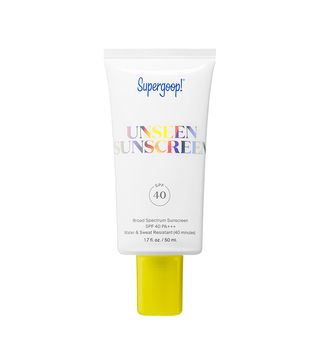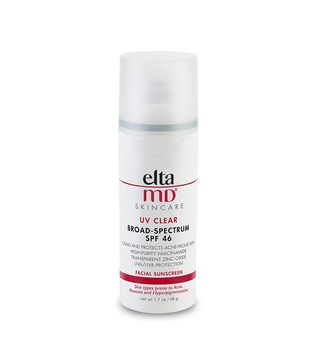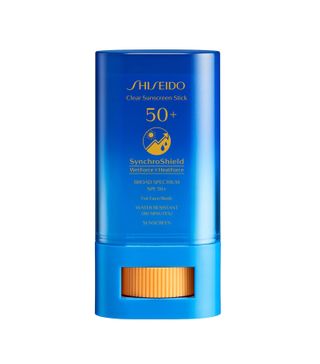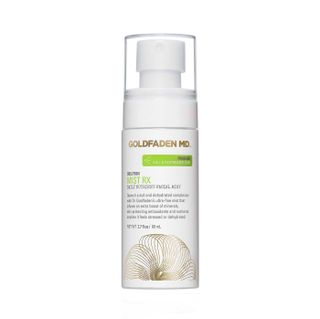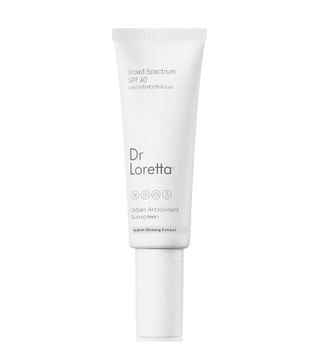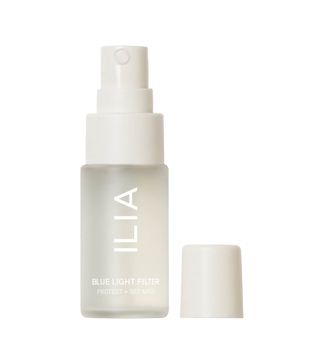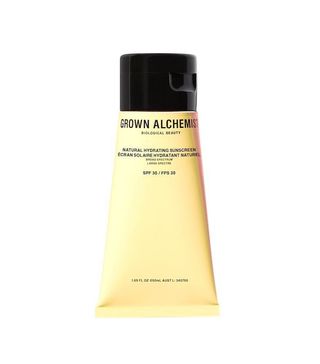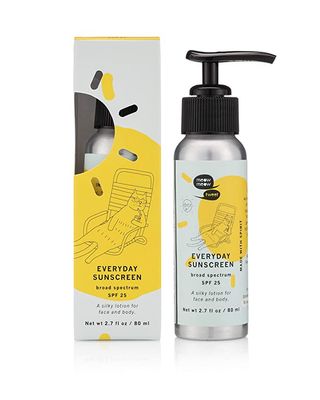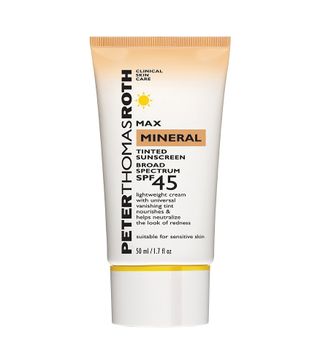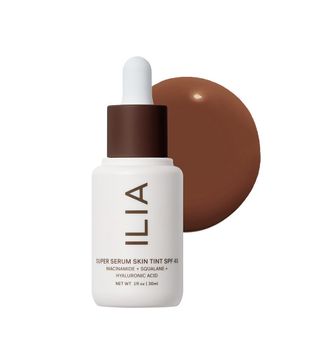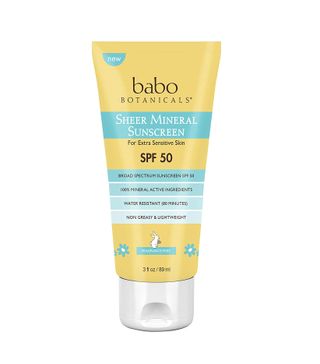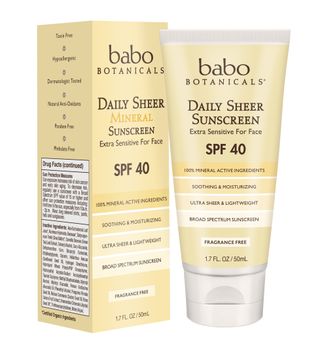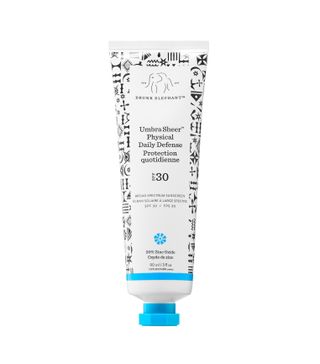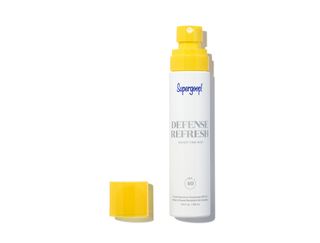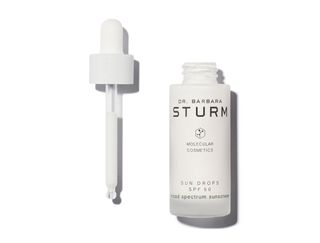For Healthy Skin, You Don't Want to Miss This Crucial Skincare Step
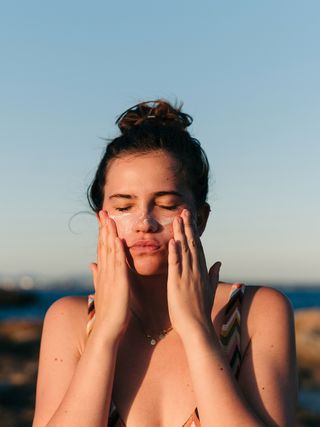
When it comes to skincare, there is one definitive rule that sits at the top of the list that no one will fight you on: Sunscreen is one of the most crucial ways to keep skin healthy. The protective layer of SPF prevents burning, aging, sun damage, and more. It's a given to apply it when you're headed to the beach in the sunny months, but what about the other 10 months, or what about when you're indoors working from home or bingeing TV?
In short, you're going to want to wear sunscreen indoors. About 75% of UVA rays are exposed in most homes, and it's worse if you're seated next to a window—even on an airplane. Indoor lighting, specifically halogen and fluorescent, also contributes to a lot of free radical damage to the skin. Even low-dose UV exposure accumulates over time. Since the majority of UV exposure comes from the sun and through window glass, and damaging light is also emitted by your devices, it's important to protect your skin.

The most important takeaway from this is to make sure you choose a sunscreen that says "broad spectrum" and is SPF 30 or higher. "Personally, I prefer mineral or physical blockers because they are less likely to cause irritation and offer better protection for pigmentation issues. If you choose a chemical blocker, you need to apply it about 20 to 30 minutes before going outside because that's how long it takes for it to become effective. And the most important thing that most people forget about when applying sunscreen is to reapply every 90 minutes, especially if you are sweaty! And reapply after every ocean or pool dip, even if it says water-resistant," explains Loren Franco, MD, FAAD, of Dermatology Specialists of Monmouth County, New Jersey.
When we wear sunscreen, we are protecting our skin from three types of damaging sun rays: UVA, UVB, and blue light. And when we say that not all rays are created equal, we mean it.
What's the Truth About These Rays?
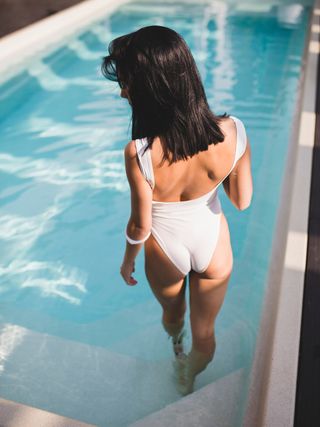
UVA rays have long wavelengths, which is why they get through windows. They even penetrate past the epidermis (the surface layer of your skin) and can degrade your collagen levels, cause wrinkles and aging signs, and put you at risk for skin cancer.
UVB rays, on the other hand, are probably the most familiar, as they cause sunburns and immediate signs of skin damage (aka parched, lackluster skin). While they do have a shorter wavelength, they can be filtered by window glass, meaning they're not your enemy inside if you are well protected.
Blue light comes from the sun, and while it has a short wavelength and high energy levels, it's able to penetrate past the dermis, even deeper than UVA and UVB rays. It's also emitted through smartphones, computers, and fluorescent light. A 2010 study proves that blue light produces pigmentation and redness in the skin.
Only recently did we learn that certain wavelengths of visible light in the blue-light spectrum can lead to early onset and more stubborn skin concerns. What we do know is that a chemical in the skin called flavin absorbs blue light, and blue light destroys collagen through oxidative stress. This can produce unstable oxygen molecules (free radicals) that damage the skin.
How Damaging Are These Rays?

"The effects of the sun on our skin are not new news and definitely not fake news. I see it every day in my practice, whether I am treating skin cancer or counseling patients for various cosmetic treatments to undo sun-aging," Franco says. "It's easy to ignore when you're young—out of sight, out of mind. But think about sun protection now as an investment for your future! The more sun protection you do when you're young, the less money you'll have to spend fixing the damage later on."
When you wear sunscreen, you're protecting your skin from UV radiation, which can penetrate very deeply and, over time, destroy your collagen production, contribute to free radical damage, and increase hyperpigmentation.
How Should You Apply Your SPF?
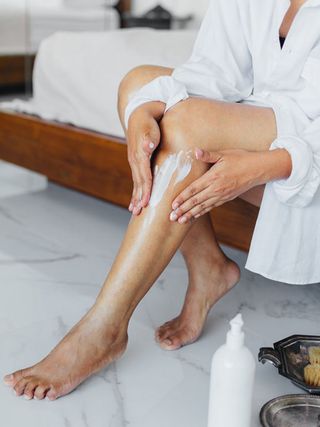
"The amount of sunscreen you apply is just as important as actually putting it on," Franco explains. "Two finger lengths is enough sunscreen for your face and neck, but I always add a little extra for my upper chest and the backs of my hands. If going outdoors, you need one ounce of sunscreen for your entire body (a shot glass worth)."
Plus, you have to keep in mind the loss of SPF that often happens with initial underapplication, sweat or rubbing, and even touching. Layering it on as the last step of your regimen before applying your makeup ensures it's easy to reapply.
And as for what SPF really means, Franco breaks it down for us: "SPF is calculated based on how much sunscreen is being applied. SPF 15 blocks out 93% of UV, while SPF 30 blocks 97%, and SPF 50 blocks 98%. The problem is if you're only putting on half the recommended amount, you're only getting half the coverage."
How to Create Better Sunscreen Habits
If sunscreen isn't part of your routine, and you worry the damage is done, it's never too late to start. It's all about creating healthy habits, and that starts with a few extra minutes each morning. It then becomes part of your routine, and as soon as you finish brushing your teeth and cleansing your face, you'll reach for your SPF.
On days when you're indoors, all exposed areas, including the face, neck, upper chest, and back of your hands, should be protected. Reapplying is also a must, so at the same time you're reaching for a midday snack, reapply! This might come in handy for those times when you go out for a spontaneous little walk or an unplanned errand. And when you're enjoying a beach day, be smart and try to protect your skin with hats, umbrellas, and maybe even protective clothing. Don't forget: You should be reapplying every two hours.
Other small changes that might make a big difference when it comes to blue-light exposure are making an effort to not sit so close to your screens and even switching light bulbs to LED. When a curtain is possible, cover up your windows. And take extra caution when you're in a car or on an airplane.
Sunscreens to Shop
For Blue-Light Protection
This Goldfaden MD facial mist helps hydrate and soothe dull, dehydrated skin while also protecting it from pollution and harmful UV blue-light exposure. This ultra-fine mist gives your skin an extra boost of minerals and nutrients due to the power-packed ingredients including antioxidants, hyaluronic acid, potent plant and fruit stem cells, aloe and kale sprout water, probiotics, and vitamin C.
This sunscreen, created by Loretta Ciraldo, MD, FAAD, a Miami-based board-certified derm with over 40 years of experience, protects from UVA, UVB, and HEV light emitted from the sun and electronic devices due to its Indian ginseng extract. Ciraldo was among the first to study the effects of UV in the labs at Harvard and created her line with her trademark antioxidant, Lipochroman, which provides the strongest defense against free radical damage, protecting skin from pollution including damage caused by tiny particulate matter.
Pumped with wonderful marine actives seawater and hydrolyzed algae, this Ilia mist feels like a veil and acts as a shield, as it helps protect the skin from pollution and blue-light exposure from tech devices and everyday pollution. Mastic visibly smooths skin, refines pores, and controls excess shine, while tara extract neutralizes free radicals, ensuring supple and smooth skin.
For an Everyday SPF
The Natural Hydrating Sunscreen from Grown Alchemist features innovative ultra-sheer natural zinc oxide to provide broad-spectrum protection from damaging UVA/UVB rays and environmental aggressors. With SPF 30, the hydrating, silicone-free primer blurs pores for flawless protection.
With a floral scent and a lotion texture, this Meow Meow Tweet Everyday Sunscreen serves as a great base for your routine. It has SPF 25 and is made with plant-based, moisturizing ingredients that won't clog pores on your face or body. Plus, the pump makes for easy application, especially when you're in a hurry.
For a Tinted SPF
If you're looking for something that's more like makeup than skincare, try this tinted option. This all-mineral sunscreen lotion provides broad-spectrum SPF 45 UVA/UVB protection for sensitive skin with zinc oxide and titanium dioxide. Formulated with safflower extract and vitamins C and E to help nourish and comfort, the universal vanishing tint helps neutralize the look of any redness. Additionally, light-scattering optics from diamond powder give the skin a natural-looking, radiant finish.
Another option from Ilia is the Skin Tint with SPF 40. With a range of over 15 shades, the serum provides weightless mineral protection from UVA, UVB, UVC, and blue light with no white cast. Use it on clean, moisturized skin. When first applied on the skin, it appears lighter as a guide for SPF application, and after 30 to 60 seconds, the shade will adjust to its true color.
For a Sweat-Proof SPF
This new mineral-based formula contains 100% zinc oxide, which sits atop the skin and physically blocks the rays from absorbing into the skin. The lightweight, non-greasy, and hypoallergenic formula is enriched with calendula, shea butter, and organic cocoa butter to soothe and moisturize the skin. Since it provides UVA/UVB protection for 80 minutes and is water- and sweat-resistant, this is the best choice for the outdoors.
This lightweight, ultra-sheer, and hypoallergenic formula was intended for super-sensitive skin. It contains organic aloe vera, avocado, and jojoba oil to soothe and moisturize skin, plus rose hip and green tea to help prevent premature aging. Since the brand is so affordable, it's worth stocking up on a few and leaving them in places you often check.
Drunk Elephant's sunscreen provides powerful broad-spectrum UVA/UVB protection and helps prevent free radical and oxidative damage. Sunflower-shoot extract and raspberry seed oil both offer antioxidant protection from damaging environmental aggressors. While it's thick in texture, it's ideal for daily use (without white residue or greasiness). And since it's developed without chemical screens or silicones, it's suitable for all skin, including the most sensitive.
For Touch-Ups Throughout the Day
This three-in-one SPF mist sets makeup, controls shine, and refreshes UV protection. Antioxidant-rich rosemary and mint work to enhance your complexion while optical-diffusing silica silylate controls oil and scatters light to reduce shine. With your eyes closed, spray it four to five times in a circle around your face as the last step in your routine, over makeup, and definitely throughout the day.
These Sun Drops from Dr. Barbara Sturm are a lightweight SPF 50 serum that you can wear alone or mixed with your favorite moisturizer. The cassia extract, vitamin E, and beta-glucan in the formula slow the development of wrinkles while preventing facial brown spots and skin discoloration caused by UV rays.
Next: Dermatologists Want You to Avoid These 5 Sunscreen Ingredients
Disclaimer
This article is provided for informational purposes only and is not intended to be used in the place of advice of your physician or other medical professionals. You should always consult with your doctor or healthcare provider first with any health-related questions.
-
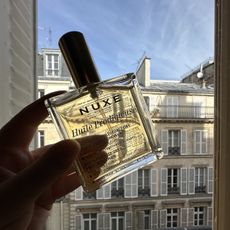 17 Iconic French Pharmacy Products I Picked Up During a Week in Paris
17 Iconic French Pharmacy Products I Picked Up During a Week in ParisI was determined to fit them in my suitcase.
By Kaitlyn McLintock
-
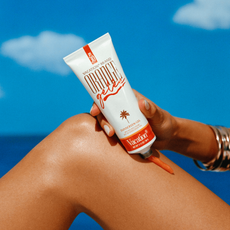 Vacation Brought Back Orange Gelée—Just in Time for a Luxe, French-Girl Summer
Vacation Brought Back Orange Gelée—Just in Time for a Luxe, French-Girl SummerBooking a getaway to St. Tropez stat.
By Marie Lodi
-
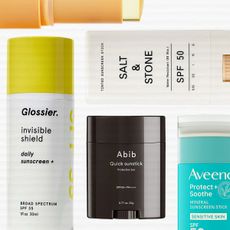 This $8 Product Is the 3-Second Key to Damage-Proof Skin
This $8 Product Is the 3-Second Key to Damage-Proof SkinYour skin deserves extra TLC.
By Maya Thomas
-
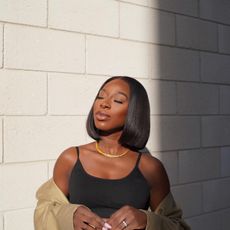 These Are the Only Sunscreens Beauty Editors Will Wear Under Makeup
These Are the Only Sunscreens Beauty Editors Will Wear Under MakeupThere's something for everyone.
By Shawna Hudson
-
 Hailey Bieber Used the New Brightening Sunscreen You're About to See Everywhere
Hailey Bieber Used the New Brightening Sunscreen You're About to See EverywhereGet it while it's hot.
By Katie Berohn
-
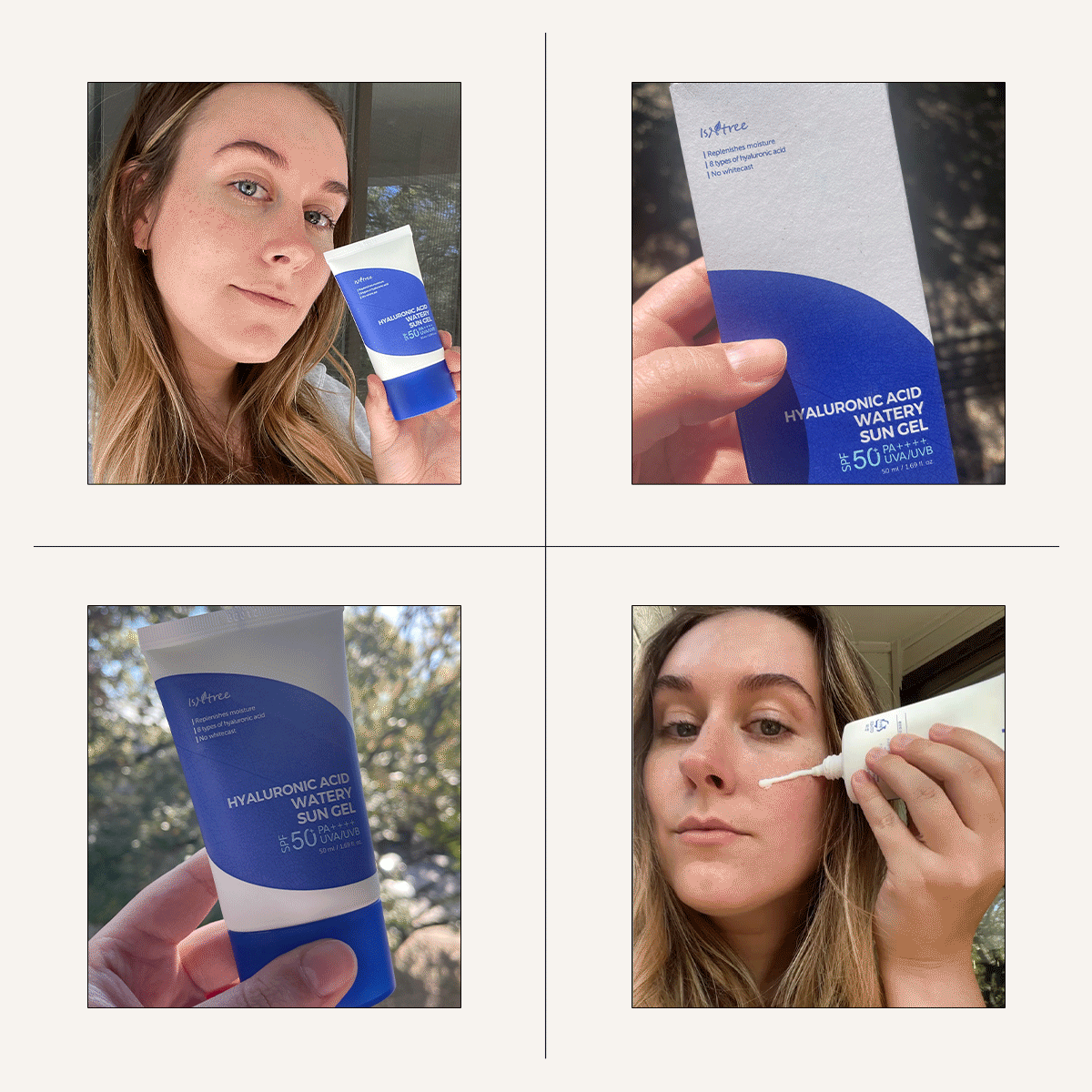 This $25 Sunscreen Has Been on My Skin Every Day for a Year—Here's Why It's #1
This $25 Sunscreen Has Been on My Skin Every Day for a Year—Here's Why It's #1I literally tell everyone to buy it.
By Kaitlyn McLintock
-
 Psst—Here's How to Reapply Face Sunscreen Without Ruining Your Makeup
Psst—Here's How to Reapply Face Sunscreen Without Ruining Your MakeupIf only I had known this sooner.
By Katie Berohn
-
 Pamela Anderson and Hailey Bieber Love This $36 Sunscreen From Summer Fridays
Pamela Anderson and Hailey Bieber Love This $36 Sunscreen From Summer FridaysIt's a "mineral milk" formula.
By Kaitlyn McLintock
